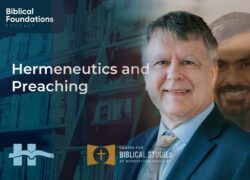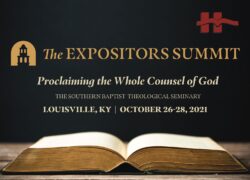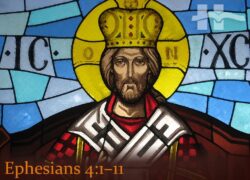aBeLOG
Welcome to the aBeLOG, a series of (hopefully!) fortnightly posts on all matters homiletical. I intend to touch on whatever grabs my attention regarding preaching—issues contemporary and ancient, ideas hermeneutical and rhetorical, personalities conservative and liberal, publications antiquarian and avant-garde. Essentially, I’m going to follow my own homiletical olfactory instincts up rabbit trails and after red herrings. Comments are always invited and appreciated.
Biblical Foundations Podcast
I was interviewed some time ago on Biblical Foundations Podcast by my friend, Dr. Andreas Köstenberger of Midwestern Baptist Theological Seminary.
Here’s our conversation on hermeneutics and preaching (in two parts):
Expositors Summit
If you are in the Louisville, KY, area on October 26–28, 2021, do plan to attend the Expositors Summit, organized by The Southern Baptist Theological Seminary.
Yup, yours faithfully is speaking (twice) on a couple of real obscure passages from the Bible. Lots of blood and gore, I promise!
More info: see video, below, and go here …
Ephesians 4:17–32
Believers, no longer living licentiously, are being divinely renewed into the likeness of God that is manifest as they maintain unity and engage in activities that build up one another.
The chronological sequence of events in Ephesians 4:17–18 appears to be written in reverse. Reordering the series, the progression looks like this: hardness of heart (4:18d) → ignorance (4:18c) → exclusion from the life of God (4:18c) → darkness in understanding (4:18a) → futility
Ephesians 4:1–16
Selfless and loving exercise of grace-gifts, that leads to peaceful unity, builds up the body to the mature stature of its head, Christ.
In this section, there is an explicit exhortation to unity with a sevenfold declaration of the unifying elements of the faith, in which are present the members of the Trinity (Eph 4:1–6). These seven acclamations of the core unities of the Christian faith (4:4–6) appear to be deliberately crafted to reflect the significance of the
“Applicable,” not “Obeyable”!
For those interested in following my writing endeavors, there is a new article I’ve written for the Journal of the Evangelical Homiletics Society available here.
It is actually an essay-length book review of John H. Walton and J. Harvey Walton, The Lost World of the Torah: Law as Covenant and Wisdom in Ancient Context (Downers Grove: InterVarsity, 2019). This volume is part of InterVarsity’s Lost World series and the second tome co-authored
Moving!
Folks, a big announcement:
As of July 1, 2021, I will be on the faculty at The Southern Baptist Theological Seminary, teaching preaching. After almost a decade-and-a-half teaching at Dallas Theological Seminary, I’m uprooting and moving, lock, stock, and barrel, to ye olde town of Louisville, Kentucky.”
See Southern Seminary’s press release here.
I am grateful for your prayers for the transition and beyond!
New Commentary!
This is a rehash of an old post, redone to announce my new commentary that’s just come out: 1–2 Timothy, Titus: A Theological Commentary for Preachers.
I’m frequently asked by my students about commentaries I employ in my preaching prep.
My son, be warned: the writing of many books is endless,
and excessive devotion to books is wearying to the body.
Ecclesiastes 12:12
Qohelet notwithstanding, I do have a variety of commentaries collected over the years—no



















 Abe Kuruvilla is the Carl E. Bates Professor of Christian Preaching at The Southern Baptist Theological Seminary (Louisville, KY), and a dermatologist in private practice. His passion is to explore, explain, and exemplify preaching.
Abe Kuruvilla is the Carl E. Bates Professor of Christian Preaching at The Southern Baptist Theological Seminary (Louisville, KY), and a dermatologist in private practice. His passion is to explore, explain, and exemplify preaching.